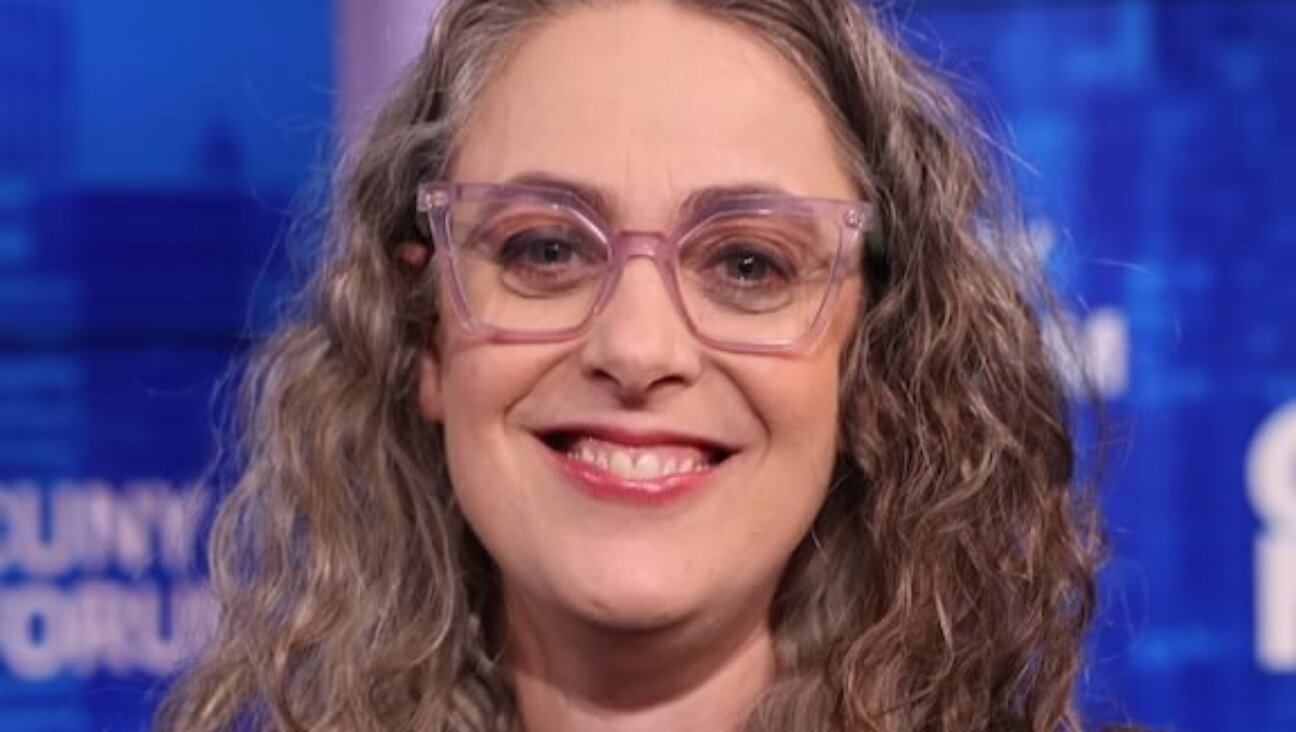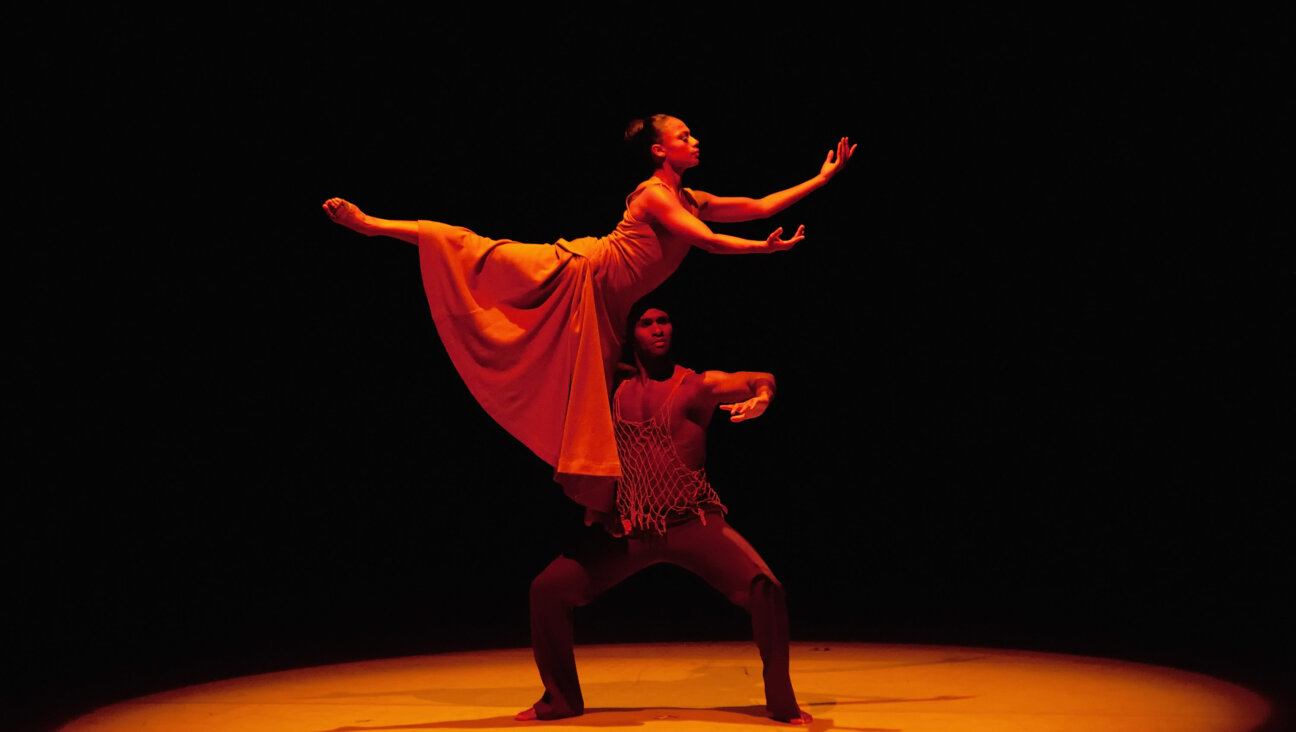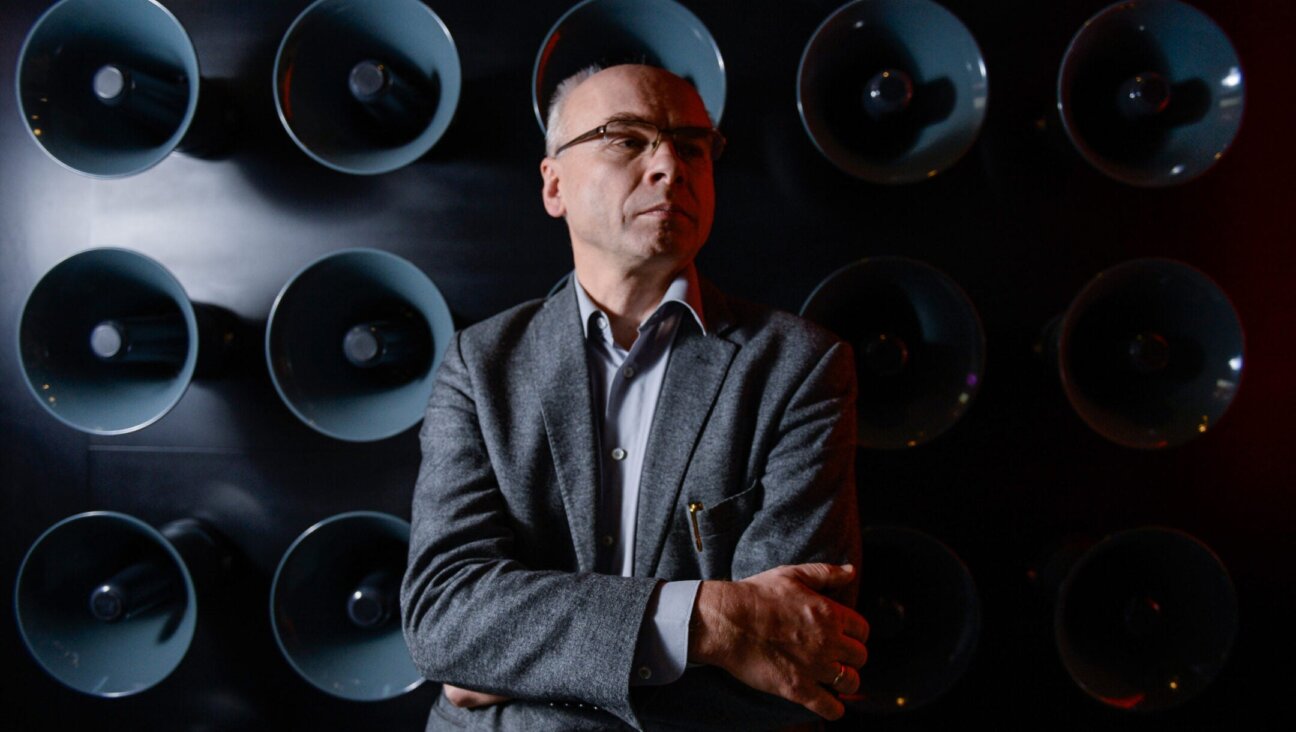You are not obliged to finish this column
Unpacking the Talmudic quote Shaina Taub cited in her acceptance speech at the Tony Awards

Shaina Taub with her Tony — and Rabbi Tarfon’s Talmudic wisdom. Graphic by Odeya Rosenband. Photo by Theo Wargo/Getty Images for Tony Awards Productions.
When you lead a Jewish news organization like the Forward, you watch entertainment awards shows through what we like to call a Jewish lens.
You keep count of how many winners are members of the tribe. You notice if a presenter wears a pin connected to the war in Gaza. You perk up if an actor mentions, say, a childhood role in Fiddler on the Roof.
And when Shaina Taub, the creator and star of the musical Suffs, quotes from the Talmud as she accepts the Tony Award for Best Score this past Sunday, you text your culture writer to see if he has a take. He does, and you edit it and publish it around 10:30 p.m. and lots of people read it and, normally, you move on to the next thing.
Unless you’re me and it’s this week and you cannot get the quote — Rabbi Tarfon’s famous “You are not obliged to finish the work but neither are you free to desist from it” — out of your mind.
In that case, you see applications for this aphorism all around you. It’s behind how you talk to your son about studying for final exams even though they won’t change his grade and how you nudge your daughter to clean up after her latest sewing project even though the rest of the basement is a proper mess. It’s why I spend part of each day fixing typos in articles. It’s getting up before dawn to work out, it’s
eating a healthier breakfast, and it’s telling the messy, complicated, nuanced full truth about Israel even when it seems nobody on any side really wants to hear it.
And, since you’re me and you have this weekly column to write, you call up your personal panel of rabbis to ask why this particular quote is so powerful and so permeable and so darn popular.
“There’s a Ben Franklin almanac aspect to this,” explained Rabbi Elliot Cosgrove of Park Avenue Synagogue in Manhattan. “You can’t go to Jewish camp without singing this,” he added, referring to the Hebrew version, Lo alecha hamlacha ligmor. “It became anthemic for a certain generation.”
I know a lot of rabbis — occupational hazard, I suppose — but think of Cosgrove, who officiated at my wedding, as one of “my rabbis.”
The others are Rabbi Marc Katz, who heads the Reform congregation in Bloomfield, N.J., where our kids became b’nai mitzvah in 2020; and Rabbi Benji Samuels, the longtime leader of the Modern Orthodox shul in Newton, Massachusetts, that my parents helped build. This time, I also consulted my new-ish friend Rabbi Sandra Lawson, who is chief diversity officer at Reconstructing Judaism and a member of the Forward Association.
Katz said it’s one of his “top five” “go-tos” among Jewish texts. Such quotes “can be really helpful in keeping young people engaged in Judaism,” Lawson noted. “Rabbi Tarfon’s an A-lister in the Talmud,” said Samuels. “He says a lot of the things.”
This particular thing comes from Pirkei Avot — Ethics of the Fathers — the page-a-day-calendar-type collection of bits of rabbinic wisdom. It’s at the end of Chapter 2 (verse 16) and here’s the full quote (translation from Sefaria.com):
The day is short, and the work is plentiful, and the laborers are indolent, and the reward is great, and the master of the house is insistent. … It is not your duty to finish the work, but neither are you at liberty to neglect it; If you have studied much Torah, you shall be given much reward. Faithful is your employer to pay you the reward of your labor; And know that the grant of reward unto the righteous is in the age to come.
My rabbis all said the quote is most often invoked in a social justice context, in the face of overwhelming problems like climate change, poverty or racism. For liberal Jews, it is also applicable to ritual observance; maybe you’re not going to keep strictly kosher, but avoiding pork and shellfish means that when you’re scanning a restaurant menu for what you can and cannot eat, your Judaism is at the table with you. It’s also helpful in tackling personal challenges, like weight loss — every journey of a thousand miles starts with a single step is the Chinese-proverb version.
For Rabbi Samuels, who years ago worked on a neuroscience study on how aphorisms are absorbed by our brains, the quote is emblematic of what he called Judaism’s “dialectic between the individual and the collective.”
“The Torah tradition invests great responsibility, and to some degree power, in the individual, the individual can make a difference,” he explained. “And at the same time, there are countless emphases that none of us alone can do much of anything, that humanity — and the Jewish people more particularly —are collective endeavors. So, you don’t have to finish the whole yourself, but you do have to play your small role in the collective enterprise.”
For Rabbi Katz, it’s connected to his forthcoming book about Judaism and pragmatism, Yochanan’s Gamble. The title comes from a foundational myth of rabbinic Judaism: Around 70 C.E., Yochanan is granted a wish by the new Roman emperor, and instead of requesting an end to the siege of Jerusalem in which the Second Temple was destroyed, he asks that he and two other rabbis be allowed to remake Judaism in the city of Yavneh.
“Better you ask for the imperfect thing that you have a chance to get than ask for the thing you likely won’t get because you’re going for broke,” Katz said. “I’d rather get something done than get nothing done.”
Rabbi Lawson said the quote is linked “to the idea that we are co-creators with the divine.” She shared a story from rabbinical school, when she — a longtime vegan — was taking a class on environmentalism with a friend who was “a strong meat eater.”
“He’s learning about factory farms, and he’s learning about recycling — he said in class, ‘This is too much, what’s the point, I can’t do it,’” Lawson recalled of her carnivorous friend. “I said to him, l’at, l’at, a little bit at a time. I was a vegetarian and then I backslid and ate meat again. I just took little steps. But when I look back 20 years later, I’ve made huge progress.”
Lawson takes a similar approach to conversations about racism.
“One of the the things I say to people is, ‘Let’s try to be less racist,’” she told me. “We’re trying to slowly unpack centuries of racism that has weaved its way into every single part of our society. For many people that’s too much. But if we don’t tackle it in some way, we’re never going to move from being a racist society.
“It’s a strong Jewish value: When we see something that’s wrong in our society, we do our best to do something to repair it.”
Rabbi Cosgrove noted that the “employer” in the full quote could be perceived as either your actual employer or “your employer on high” — God — and that “the age to come” could be read as the afterlife or the next generation. So the text is “accessible to a Jew, a non-Jew, a believer and nonbeliever,” he said.
“It’s very human, when faced with a task of enormity — whether that’s a book you want to write or peace in the Middle East — that you just throw up your hands and say, ‘Who am I to effectuate change,’ and that’s where Tarfon comes in,” he said.
“A lot of people are saying right now: I’m overwhelmed by antisemitism. Whether it’s a water-cooler talk or what’s happening on campus or what’s happening on social media — there are so many of them, it’s so overwhelming and so frightening,” Cosgrove continued. “Take one of your non-Jewish friends out for coffee and talk about it. Don’t use the enormity of the project as an excuse for your inertia.”
Taub ascended the Tonys stage in a shiny purple pantsuit Sunday night, practically hyperventilating from excitement and surprise. The authenticity of her emotion was contagious; that was me crying on the couch.
“To all the theater kids out there watching — especially the loud little girls — go for it,” she said. “You are powerful. If you doubt yourself, it’s OK. You can do it. I doubt myself all the time.”
Suffs, the musical Taub wrote based on true events and characters in the campaign for the 19th amendment, is all about not desisting from the task even if you have no hope of finishing it.
Taub stars as Alice Paul, a young suffragist pushing the older, high-society leaders of the movement to be more aggressive. She, in turn, is pushed by Ida B. Wells and other Black feminists to be more inclusive. And the show ends with Paul, who died in 1977, being confronted by a younger generation about the (still) unfinished business of the Equal Rights Amendment.
Now 35, Taub grew up in Vermont celebrating “Hanukkah and Passover a little bit,” as she put it in a 2021 interview with Hey Alma, but not attending synagogue or knowing “much about the Jewish identity.” She spoke about the quote in a 2016 interview with Stage & Candor; invoked it in a 2018 Instagram post about the Tree of Life massacre; and used it as an epigraph on the Suffs script.
“It’s part of the thesis of the show,” she told Hey Alma. “So much of the language of activism is about this finality of finishing a struggle — never again, enough is enough, ‘If not now, when?’ But the fights and the struggles for equality and justice are never finished, and no generation really completes that work.
“It doesn’t mean you don’t still have to work and fight and organize as if you could finish it,” she continued. “It’s holding that contradiction in your head as an activist, and as any person working towards a better future.”
Tarfon did not say it any better.
Though I am, in fact, obliged to finish writing this column. And now I have.
Corrections: The original version of this article mistakenly said that Shaina Taub was the director of Suffs. She is not; it is directed by Leigh Silverman. It also misstated Taub’s age; she is 35, not 36.

















